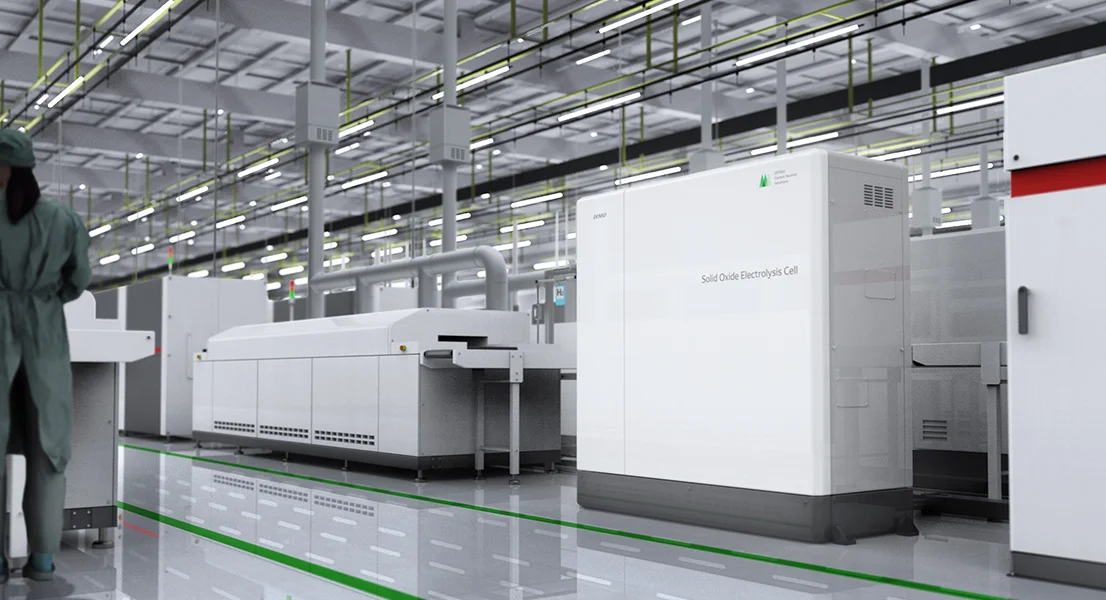

Mar 16, 2023
TECH & DESIGNDeveloping solid oxide fuel cells to help disseminate clean energy throughout society
Utilizing heat management technologies to achieve both environment performance and economic feasibility
It is expected to utilize hydrogen suitably in order to realize the carbon neutrality. It is especially necessary to generate green hydrogen from renewable energy at low cost, and to efficiently utilize it.
DENSO has been developing solid oxide fuel cells (SOFCs), which generate electricity and heat by reacting chemically oxygen and fuels such as hydrogen, and has been challenging itself to realize both environmental performance and economic feasibility.
Contents of this article
SOFCs: fuels cells with excellent efficiency

Fuel cells generate electricity and heat by reacting chemically oxygen and fuel such as hydrogen. When hydrogen is used as fuel, fuel cells only emit water and do not emit CO2. They are split into two kinds based on the types of electrolytes and their reaction temperature range.

Fuel cells used for FCEVs(Fuel Cell Electric Vehicles) are called PEFCs(Polymer Electrolyte Fuel Cells), and they use polymer membranes as their electrolytes. The polymer membrane reacts chemically at about 100 degrees Celsius, giving these fuel cells the advantage of a quick reaction startup. SOFCs, on the other hand, can raise the internal temperature up to about 700 degrees Celsius, as they use a ceramic membrane.
This high reaction temperature means that SOFCs take longer to start their reaction than PEFCs, but offers the significant advantage of much higher efficiency, which is why SOFCs are used for stationary equipment.
And SOFC can also generate electricity using carbon-derived fuels such as natural gas, which is the most used gaseous fuel in the market.

DENSO's bold challenge to improve SOFC
SOFCs have already been in practice for both household use and commercial use. Why has DENSO been working on the development of the product? Takamasa Osugi from the company’s Environment Neutral Systems Development Div. says “We believe that DENSO’s technologies can improve the environmental performance of SOFCs.”
“Carbon neutrality cannot be achieved in one go. In order to realize both environment performance and economic feasibility, it’s necessary to proceed one step at a time. Regarding SOFCs, indeed we can reduce CO2emissions to zero by using carbon-neutral fuels, but I think it has not been easy yet to use them in terms of their costs and delivering. Thus we decided to try using city gas, which has a low environmental impact, as the fuel for our SOFCs in order to maximize energy saving.
SOFCs have the inherent advantage of very efficient electric power generation. By raising their efficiency even further, we can minimize wasted energy and contribute to reducing CO2emissions.”

But DENSO must overcome various challenges to achieve highly-efficient electric power generation.
“In standard fuel cells, about 20 percent of the fuel is not used in the chemical reactions, and is sent to later processes. This is because the cells used for power generation are incredibly delicate, and attempting to react 100 percent of the fuel would deteriorate cells. It prevents electricity generation from raising its efficiency, because it loses energy even though it is necessary to prevent cells from deteriorating. Our challenge is to figure out how to use this energy without wasting any of it during the overall process.”
In addition to improving power generation efficiency, he would like to challenge himself to extend product life.
“If SOFC system components have short lifetimes, then more money must be spent on parts replacement, maintenance and the like, making it economically more difficult to use SOFCs in practice.
Components and metal materials used for power generation must be more durable to extend product lifetimes. They are directly affected by temperature changes inside the SOFC, as the internal temperature rises to as high as 700 degrees Celsius. It is extremely important to control internal temperature in order to achieve long product lifetime, as well as improve power generation efficiency.
Our major challenges of improving power generation efficiency and extending component lifetimes. We are looking to overcome our challenges by using the heat management technologies we have developed through decades of experience in mobility products development.
Leveraging DENSO’s know-how to overcome challenges of SOFC
Takashi Ojiro from DENSO’s Environment Neutral Systems Development Div. is involved in developing SOFCs. He explains how heat management technologies are being utilized in development of SOFCs.

“20 percent of the unreacted fuel is emitted from the cell stack, and we make efficient use of them. 10 percent of the unreacted fuel is returned to the inlet of the system to be recirculated, and the other 10 percent is burn in the combustor to recover its heat for the reformer. In addition, DENSO uses ejectors, which are a kind of fluid pumps that can operate at high temperature, to recycle fuel, and achieves high efficiency in generating electricity.”

“It is important to keep cell stacks and other components within the target temperature range in order to extend products lifetimes as well as achieve high generation efficiency. We are looking to solve the issue by the technology of thermal radiation to transfer heat via electromagnetic waves between components not directly touched each other, and thermal management technologies such as components placement and control of high-temperature fluid flow.
By utilizing recycling and heat management technologies in these ways, we are aiming to achieve power generation efficiency at the highest level exceeding 65%, which is even higher than in thermal power plants, as well as extend product lifetime.”

It is important to stably produce high quality products in order to spread SOFC throughout society. As DENSO manufactures mobility products responsible for the people’s lives, it is extraordinarily committed to quality. Moreover, the company has excellent production technologies to mass produce high-quality products. Regarding the SOFC project, DENSO has involved various manufacturing divisions from the early stages, and is now preparing for mass production of high-performance SOFCs which has already been created during its design phase.
Further advancements in SOFCs for a carbon-neutral future
While making full use of in-house strengths to overcome the challenges of power generation efficiency and long product lifetime, DENSO is looking ahead to more possibilities of SOFCs. To create SOFC products with even better environmental performance and thus contribute to carbon neutrality, Ojiro says that SOFCs must be made compatible with more types of fuel:
“Current SOFCs use city gas as their fuel. To improve their environmental performance, we need to find a way to utilize carbon-neutral fuels. However, such fuels are expensive to purchase and uneconomical, so our next step is to design our SOFCs to be compatible with mixed fuel of city gas and green hydrogen. Designing the products to use this mixed fuel will greatly reduce its CO2emissions.
As carbon neutrality progresses in the society, carbon-neutral fuel is expected to spread there, such as green hydrogen, biomethane and others. DENSO is developing SOFCs that will be compatible with a wider range of fuels in the future.”

DENSO will continue to challenge itself to create a brighter future for our planet. To do that, we will develop SOFCs looking ahead to their various possibilities, such as more power generation efficiency and more fuel compatibility. And we will challenge ourselves more with our partners who share our values to create new future together.

REACTION
Changing your "Can'ts" into "Cans"
Where Knowledge and People Gather.




Leave a comment